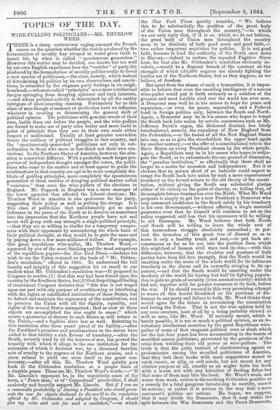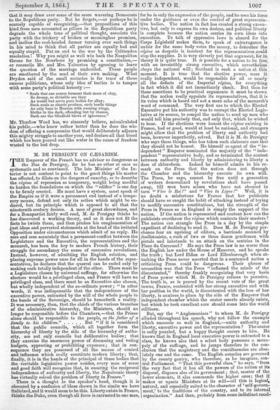TOPICS OF THE DAY
WIRE-PULLING POLITICIANS :—MR. Tit URLOW WEED.
/THERE is a sharp controversy raging amongst the French savan,s on the question whether the vesicle produced by the fermentation of mouldy hay steeped in water gives birth to bleed. life by what is called "spontaneous generation." However this matter may be decided, one knows but too well by our own English experience how the "vesicles" of party life produced by the fermentation of mouldy politics really do breed a new species of politicians,—the class namely, which instead of determining its politics by its own Observations and convic- tions, is saturated by the stagnant party feelings in its neigh- bourhood,—whoseso-called "principles" are a mere intellectual fungus springing from decaying opinions and rank interests, —and whose political activity is determined by all the earthy intrigues of electioneering cunning. Fortunately for us this class of men though of moment at an election have no influence whatever in creating or determining the general drift of political opinion. The politicians with genuine creeds of their own, battle them out before the people, and the wire-pullers are forced to make use of party cries better and more lucid in point of principle than they can in their own souls either respect or understand. Usually at least genuine conviction traces the outlines of political struggles in this country, and the ' spontaneously-generated ' politicians act only in sub- ordination to those who more or less think out their own con- victions. In the Northern States of America, however, the situ- ation is somewhat different. With a probably much larger pro- portion of independent thought amongst the voters, the politi- cians who come to the surface and at least appear to guide the combinations in that country are apt to be more completely des - titute of guiding principles, more completely the spontaneous generation of those vesicles of decaying political matter called "caucuses," than even the wire-pullers of the elections in England. Mr. Coppock in England was a mere manager of the lower agencies that affected the Liberal elections ; Mr. Thurlow Weed in America is also spokesman for his party, suggesting their policy as well as pulling the strings. It is this class of politicians that unfortunately get so much influence in the press of the North as to deceive us sometimes into the impression that the Northern people have not and never will grasp with any strength a single political principle, —that they are as willing to chaffer for a temporary compro- mise with their opponents by surrendering the whole basis of their political thought, as they would be to gain the same end by paying down a few more millions of dollars. For example, this great republican wire-puller Mr. Thurlow Weed,— approved by one of the most thinking and the most scrupulous of the republican papers—the New York Times,—declares his wish to see the Union restored on the basis of "Mr. Critten- den's resolution," offered in 1861. To understand the full inanity and iniquity of this suggestion let r a recall to our readers what Mr. Crittenden's resolution was—It proposed to Congress to resolve (1) that this war had been forced upon the country by the Southern States, but (2) that forgetting all feeling of resentment Congress declares that "this war is not waged upon our part with aily purpose of overthrowing or interfering with the rights or established institutions of these States, but to defend and maintain the supremacy of the constitution, and to preserve the Union with all the dignity, equality, and rights of the several States unimpaired ; that as soon as these objects are accomplished the war ought to cease ;" which means a guarantee of slavery to such States as will return to the Union,—and a fugitive slave law as well. Referring to this resolution after three years' proof of its futility,—after the President's promises and proclamations to the slaves have added to that futility a rich flavour of treachery,—after the South, severely tried by all the horrors of war, has proved the tenacity with which it clinos to the one institution for the extension of which it declared war, by a thousand horrible acts of cruelty to the negroes of the Northern armies, and a stern refusal to yield one atom itself in the great con- trovenry,—after all this, Mr. Thurlow Weed quietly goes back to the Crittenden resolution as a proper basis of a durable peace. These are Mr. Thurlow Weed's words :—" If Mr. Lincoln's opponent be, in the unpatriotic sense of the term, a 'Peace man,' or of Copperhead' proclivities, I shall zealously and heartily support Mr. Lincoln. But if I can see a reasonable probability of electing a President who would prose- cute the war for objects declared to the world in the resolution offered by Mr. Crittenden and adopted by Congress, I should give my voice and vote for such a candidate,"—on which the New York Times quietly remarks, " We believe this to be substantially the position of the great body of the Union men throughout the country,"—to which we can only reply that, if it is so, which we do not believe, the great body of Union men throughout the country seem to be destitute of both good sense and good faith,— two rather important requisites for politics. It-is not good faith, because to lend the authority of the North once more to Slavery,—indeed to restore the repealed Fugitive Slave Law, for that also Mr. Crittenden's resolution obviously in- volves,—would be a flagrant breach of the contract on the strength of which 150,000 negroes are already fighting the battles not of the Northern States, but as they suppose, as we, believe, of freedom.
But apart from the shame of such a transaction, it is impos- sible to believe that even the crawling intelligence of a caucus wire-puller could put it forth seriously as a solution of the greatest and most terrible civil war the world has ever seen. A Democrat may well be in his senses to hope for peace and separation,—or even for peace, separation, and a Federal bond in foreign politics only, between the South and North. Again, a Democrat may be in his senses who hopes to tempt the South back into union by servile concessions such as Mr. Jefferson Davis's organ, the Richmond Sentinel, has lately foreshadowed, namely, the expulsion of New England from the Federation,—or the fusion of all the New England States. into one, so as to give the slaveholders the upper hand again for another century,—or the offer of a constitutional veto to the Slave States on every President chosen by the whole people. Again, a Republican may be in his senses who hopes to subju- gate the South, or to exterminate the one ground of dissension, the "peculiar institution," so effectually that there shall no longer be a motive for secession and independence. But it is obvious that no person short of an imbecile could expect to tempt the South back into union by such a mere unguaranteed treachery as the formal return to the old theory of the consti- tution, without giving the South any substantial pledge either of its victory on the point of slavery, or, failing that, of its complete future domination over the North. What Mr. Weed proposes is simply to get for a new President a Democrat who may command confidence in the South solely by his treachery to his own Government,—without offering a single material guarantee even that he himself will continue to act on the policy suggested, still less that his successors will be willing to act thereupon. Mr. Weed believes that both North and South will be willing to leave the whole root of this tremendous struggle absolutely untouched ; to pol- lard the branches of this great tree of discord so as to leave it only a healthy trunk and root,—to put back cir- cumstances as far as he can into the position from which this mightiest of human civil wars took its rise,—with this difference, however, that the rivalries and passions of both parties have been fed into strength, that the North would be smarting under the scorn of the whole world for its infamous treachery to the slaves and its cowardly cringing to its op- ponent,—and that the South would be smarting under the mockery of the world for having lost half its fighting popula- tion to gain no grain of security (even nominal security) which it had not, together with far greater resources at its back, before the war. If he should succeed in this very promising attempt to waste all this fearful bloodshed on the purchase of dis- honour to one party and failure to both, Mr. Weed thinks they would agree for the future in reverencing the constitution and loving the Union. That is not the true opinion held by any sane creature, least of all by a being probably shrewd as well as sane, like Mr. Weed. If seriously meant, which is barely possible, it is not so much a political opinion, as an in- voluntary intellectual secretion by the great Republican wire- puller of some of that stagnant political ooze or slush which for the last four years has been accumulating in the hearts of mortified caucus politicians, prevented by the greatness of the crisis from wielding their old power as wire-pullers. The truth is that the petty instinct of electioneering agents so predominates among the so-called politicians of America, that they bait their hooks with mere suggestions meant to catch vacant, or silly, or evil minds, but not meant for any ulterior purpose at all, exactly as an angler baits his hook with a worm not with any intention of feeding fishes but that some of them may bite the hook. Mr. Weed's weak, and worse than weak, return to the soothing Crittenden poultice as a remedy for a fatal gangrene threatening to mortify, cannot be serious ; or rather it is serious in the way that a mere canvasser's politics are serious. He hopes, we suppose, that it may divide the Democrats, that it may widen the split between the War Democrats and the Peace Democrats, that it may draw over some of the more wavering Democrats to the Republican party. But he forgets,—or perhaps he is scarcely capable of recognizing,—that propositions of this kind from men accounted as pillars in the Republican party degrade the whole tone of political thought, associate the party with the trickery of broken or meaningless promises, and incline the cool-headed farmer turning over such things in his mind to think that all parties are equally bad and equally stupid. Put an end to the war by the Crittenden resolution I Why you might as well win back the Neapolitan throne for the Bourbons by promising a constitution,— or reconcile Mr. and Mrs. Yelverton by agreeing to leave the question of the marriage undecided. These people are smothered by the mud of their own making What Dryden said of the small sectaries is far truer of these caucus politicians, whose only idea of tactics is to tamper with some party's political honesty :— " Souls that can scarce ferment their mass of clay, So drossy, so divisible are they
As would but serve pure bodies for allay; Such souls as shards produce, such beetle things As only buzz to Heaven with evening wings, Strike in the dark, offending but by chance, Such are the blindfold blows of ignorance."
Mr. Thurlow Weed has, we sincerely believe, miscalculated Ihis public,—who know rather better than be does the wis- dom of offering a compromise that would deliberately adjourn this mighty struggle to another year, and declare all that blood which has been poured out like water in the cause of freedom wasted to the last drop.































 Previous page
Previous page